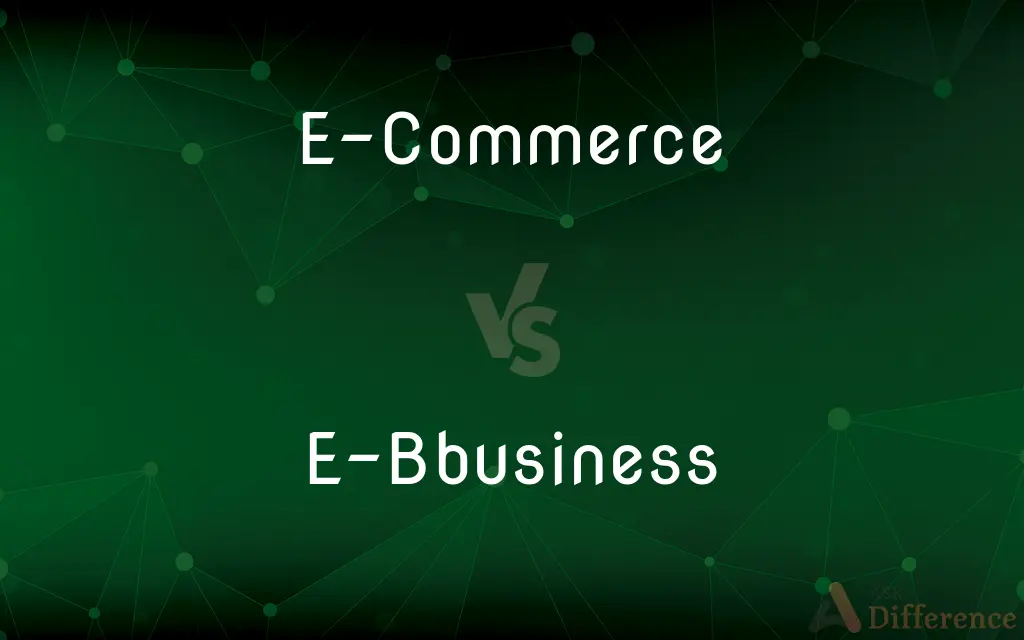E-Commerce vs. E-Bbusiness — What's the Difference?
Edited by Tayyaba Rehman — By Maham Liaqat — Updated on April 22, 2024
E-commerce involves online transactions and sales, while e-business encompasses all aspects of operating a business online, including sales, CRM, and supply chain management.

Difference Between E-Commerce and E-Bbusiness
Table of Contents
ADVERTISEMENT
Key Differences
E-commerce, or electronic commerce, specifically refers to the buying and selling of goods and services over the internet. It's a subset of e-business that focuses on the commercial transactions which can include online retail shopping, electronic payments, and online auctions. E-business, or electronic business, extends beyond the mere transactional aspects of e-commerce to include all activities required to run a business online. This broader term encompasses e-commerce activities but also includes managing internal processes such as supply chain management, electronic order processing, customer relationship management (CRM), and enterprise resource planning (ERP).
The distinction between e-commerce and e-business is significant in the context of strategic planning and operations. While e-commerce is concerned with creating effective online sales channels and optimizing transaction processes, e-business involves integrating digital technology into all business operations. This integration aims to improve efficiency, reduce costs, and enhance customer service across the entire organization.
E-commerce platforms are typically outward-facing, targeting customers directly to facilitate the purchase of products or services. In contrast, e-business strategies may also focus on internal efficiencies and business-to-business (B2B) interactions, such as automating supply chain management and integrating with business partners' systems for seamless operations.
Security is another aspect where e-commerce and e-business differ. While both require robust security measures to protect transactions and customer data, e-business must also secure its internal processes and data flows across various business functions. This comprehensive approach to security is critical in safeguarding against breaches and ensuring the integrity of business operations.
The choice between focusing on e-commerce or embracing the broader scope of e-business depends on the company's goals, industry, and scale of operations. While small businesses may begin with an e-commerce model to establish their online presence, growing businesses often evolve into e-businesses to leverage the full potential of digital technologies in optimizing their operations and achieving strategic advantages.
ADVERTISEMENT
Comparison Chart
Definition
Buying and selling goods/services online
Integrating digital technology into all business operations
Scope
Transactional
Comprehensive
Focus Areas
Online sales, electronic payments
CRM, ERP, supply chain management, online sales
Target
Direct customers
Both direct customers and business partners
Key Activities
Online retail, auctions
Process automation, online transactions, data management
Security Concerns
Transaction security, data protection
End-to-end operational security
Strategic Aim
Optimize online sales and payments
Improve efficiency, reduce costs, enhance customer service
Compare with Definitions
E-Commerce
Focuses on consumer transactions.
Using a mobile app to order groceries.
E-Bbusiness
Digital integration of all business processes.
Using online systems for inventory management.
E-Commerce
Involves electronic payments.
Paying for an online purchase with a credit card.
E-Bbusiness
Encompasses e-commerce as a component.
An online store that also automates order fulfillment.
E-Commerce
Includes B2C and B2B models.
A manufacturer selling directly to consumers online.
E-Bbusiness
Involves strategic planning for digital transformation.
Adopting cloud computing for business operations.
E-Commerce
Relies on internet marketing.
Promoting products through social media ads.
E-Bbusiness
Aims to improve operational efficiency.
Electronic invoicing and payment processing.
E-Commerce
Online buying and selling of products.
Purchasing a book from an online retailer.
E-Bbusiness
Focuses on customer and supplier interaction.
Online portals for customer service and supplier orders.
E-Commerce
Commerce that is transacted electronically, as over the internet.
E-Commerce
Commercial activity conducted via the Internet.
Common Curiosities
Is e-commerce the same as e-business?
No, e-commerce is a subset of e-business focused specifically on online transactions, while e-business encompasses all aspects of operating a business online.
How do security needs differ between e-commerce and e-business?
E-commerce primarily focuses on securing online transactions and customer data, while e-business requires comprehensive security measures across all digital operations.
Why is e-business broader than e-commerce?
E-business includes not only online sales but also the digital management of all business operations, including internal processes and B2B interactions.
How do companies transition from e-commerce to e-business?
The transition involves broader digital transformation, integrating digital technologies into all areas of business, beyond just sales.
Can a business be involved in e-commerce but not e-business?
Technically, yes. A business can engage in online sales without fully integrating digital technologies into all business processes.
Which is more strategic for long-term growth, e-commerce or e-business?
E-business, due to its comprehensive integration of digital technologies into every aspect of business operations, offering a broader strategic advantage.
Do all e-businesses engage in e-commerce?
Most do, as selling online is a key component of doing business in the digital age, but e-business also includes other digital processes beyond sales.
Can small businesses benefit from adopting e-business practices?
Yes, small businesses can gain significant advantages from digital efficiencies, even if they start with basic e-commerce activities and gradually adopt more comprehensive e-business practices.
What are the key components of an e-commerce strategy?
An effective e-commerce strategy focuses on optimizing online sales channels, marketing, and customer experience.
How has the rise of e-business changed traditional industries?
It has forced traditional industries to digitize operations, leading to more efficient, flexible, and customer-centric business models.
What makes e-business essential for modern companies?
The ability to streamline operations, reduce costs, enhance customer service, and adapt quickly to market changes makes e-business essential.
How does e-business support sustainability?
By optimizing resource use, reducing waste through efficient operations, and enabling remote work, e-business can contribute to sustainability.
What are the challenges of moving to an e-business model?
Challenges include the need for significant investment in technology, training for staff, and managing the change in organizational culture.
What role does data analytics play in e-business?
Data analytics is crucial in e-business for making informed decisions, optimizing operations, and personalizing customer experiences.
What future trends are expected in e-business and e-commerce?
Trends include increased personalization, the use of AI and machine learning for better customer experiences, and the growth of omnichannel retailing.
Share Your Discovery

Previous Comparison
Physiotherapy vs. Chiropractic
Next Comparison
Orthodox Christianity vs. Orthodox JudaismAuthor Spotlight
Written by
Maham LiaqatEdited by
Tayyaba RehmanTayyaba Rehman is a distinguished writer, currently serving as a primary contributor to askdifference.com. As a researcher in semantics and etymology, Tayyaba's passion for the complexity of languages and their distinctions has found a perfect home on the platform. Tayyaba delves into the intricacies of language, distinguishing between commonly confused words and phrases, thereby providing clarity for readers worldwide.













































